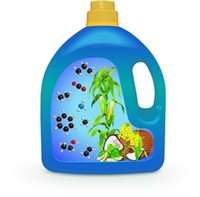Advertisement
Grab your lab coat. Let's get started
Welcome!
Welcome!
Create an account below to get 6 C&EN articles per month, receive newsletters and more - all free.
It seems this is your first time logging in online. Please enter the following information to continue.
As an ACS member you automatically get access to this site. All we need is few more details to create your reading experience.
Not you? Sign in with a different account.
Not you? Sign in with a different account.
ERROR 1
ERROR 1
ERROR 2
ERROR 2
ERROR 2
ERROR 2
ERROR 2
Password and Confirm password must match.
If you have an ACS member number, please enter it here so we can link this account to your membership. (optional)
ERROR 2
ACS values your privacy. By submitting your information, you are gaining access to C&EN and subscribing to our weekly newsletter. We use the information you provide to make your reading experience better, and we will never sell your data to third party members.
Business
Natural Versus Synthetic
Oleochemical And Petrochemical Makers Square Off
by Michael McCoy
January 29, 2007
| A version of this story appeared in
Volume 85, Issue 5
COVER STORY
Natural Versus Synthetic
Synthetic or natural, petrochemical or oleochemical: Which is better? It's a simple question but, clouded by rhetoric and hard-to-measure claims, one without an easy answer.
The contentiousness of the topic came across clearly last October at the 6th World Conference on Detergents in Montreux, Switzerland, during a talk by M. C. Menon, vice president of marketing at Pan-Century Oleochemicals, a Malaysian producer of palm-oil-derived chemicals. Standing in front of an auditorium of cleaning products executives, Menon flatly stated that detergent alcohols derived from palm oil are more biodegradable than those from petroleum and that palm-oil-based surfactants will eventually drive synthetics out of the market.
At a subsequent question-and-answer session, several conference attendees challenged his first claim, noting that numerous studies have shown raw material origin to have no impact on a product's biodegradability. But the exchange showed that makers of synthetic ingredients are on the defensive in a way their oleochemical competitors aren't.
Speaking with C&EN after the talk, Rob van der Meij, Shell Chemicals' global business manager for alcohol and alcohol derivatives, emphasized that Shell's ethylene-based Neodol alcohols meet all biodegradation standards. "There's a lot of media buzz about natural," he said. "But natural feedstocks go through steps such as esterification, hydrogenation, ethoxylation, and sulfonation" before they are in a form suitable for use in consumer products.
He also noted that the palm oil industry's environmental profile is not exactly squeaky clean. Rain forest destruction and orangutan habitat encroachment are endemic in Indonesia and Malaysia, the world's largest producers of palm oil. Retailers such as the British chain Morrisons have found it necessary to join the Roundtable on Sustainable Palm Oil to ensure that the palm oil used in their products is from verifiable, sustainable sources.
Although renewables may be no panacea, chemical companies with the right raw materials access and chemistry know-how are promoting such products as preferred ingredients for cleaning product formulation.
DuPont, for example, is now marketing Bio-PDO, the corn-sugar-derived propanediol it began producing last fall in a joint venture with the sugar refiner Tate & Lyle. In a press release announcing the plant's opening, DuPont urged producers of detergents, cosmetics, and antifreeze that are using a synthetic glycol to "consider replacing it with our new renewable ingredient."
Ann M. Wehner, vice president of sales and marketing for DuPont Tate & Lyle Bio Products, says customers in the detergents and personal care industries are curious about this new ingredient, although she doesn't have any big contracts to report yet. "We've had an awful lot of excitement from an awful lot of folks," she says. "For someone who's sold chemicals for years, it's a lot of fun to sell."
Kevin Beairsto, business manager for fabric and home care at Alco Chemical, says the company has been drawing on the natural polymer capabilities of its parent company, National Starch & Chemical, to create "materials that are not only more biodegradable than petrochemicals but are also based on renewable resources." He adds that Alco is already working with detergent industry customers to replace ingredients built on petroleum-based feedstocks.
Even within the renewables arena, there can be a hierarchy of acceptability. Degussa has long produced cationic surfactants based on tallow. In a new wrinkle, says Dave Del Guercio, director of the firm's household care business in North America, the company is successfully marketing several vegetable-oil-based cationics to kosher and other customers seeking to avoid animal ingredients. "They are not always for mainstream marketers," he acknowledges.
Indeed, outside of niche markets, it's not clear how important renewable raw materials are to consumer product companies. Last summer, the consulting firm Colin A. Houston & Associates completed a study on the battle between petroleum- and tropical-oil-based detergent alcohols. Almost all current alcohol investment is of the tropical variety, and the study predicted that tropical oils' share of the world market would rise from 61% in 2005 to at least 65% by 2010.
Joel H. Houston, president of the consulting firm, figures that some companies are in fact eager to purchase a product with natural origins. But with petroleum prices high and prices for tropical-oil-based alcohols falling, to him the purchase decision is a simple matter of economics.
Cover Story
- Going Green
- Pushed by Wal-Mart, legislators, and the public, the cleaning products industry embraces sustainability
- Natural Versus Synthetic
- Oleochemical And Petrochemical Makers Square Off
- Special Delivery
- Getting fragrance onto clothes presents a challenge for detergent companies and their suppliers






Join the conversation
Contact the reporter
Submit a Letter to the Editor for publication
Engage with us on Twitter